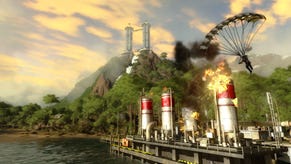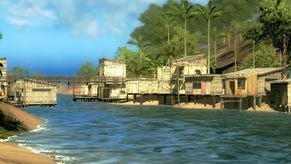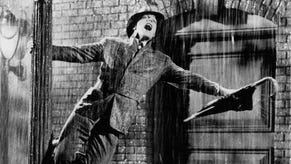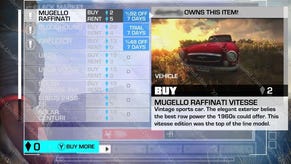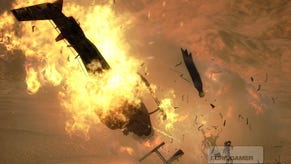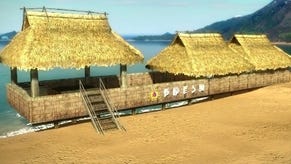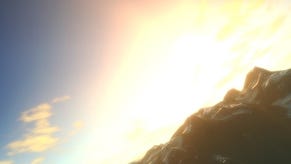Just Cause 2
Jump for joy.
Rico Rodriguez stands, head in the clouds, 1200 feet above sea level. The Southeast Asian island of Panau shimmers far below, a colourful patchwork quilt of diverse terrain, all couched within a Sonic-blue ocean upon whose surface ten thousand pricks of sunlight wink lazy. There's no time to fully take in this National Geographic photo spread of a vista, however. In twenty seconds a helicopter gunship will tear bullet holes through the cirrus wisp and silence - a problem when your feet are planted on two giant zeppelins' worth of compressed gas.
The twin 40-foot balloons are arranged side-by-side to look, from the ground, every bit like a gigantic pair of floating breasts. Beneath them hangs Just Cause 2's most recognisable skymark and seedy dance venue, the Mile High Club, a heaving celebration of juvenility and business ventures birthed on the strength of a pun.
Ten minutes earlier, Rodriguez leaped from a stolen jet at 1400 feet before falling 200 and latching a grappling hook into the airship's side and swinging overboard, the only way to gain entry to this most exclusive of videogaming's erotic venues. Five minutes earlier, Rodriguez skulked through its neon-lit belly, taking a moment to enjoy the dancers gyrating on tabletops, and to scout out the position of every barman polishing a hidden shotgun in between serving daiquiris.
Two minutes earlier, the bars now closed indefinitely and the dancers frozen in blood-flecked terror, Rodriguez pelted each of the airship's generators with a hail of Uzi fire, delivering with each resulting explosion a blow to the Panau government's ailing tourism industry. Now Rico Rodriguez stands, head in the clouds, 1200 feet above sea level, straddling a wounded airship, and listens.
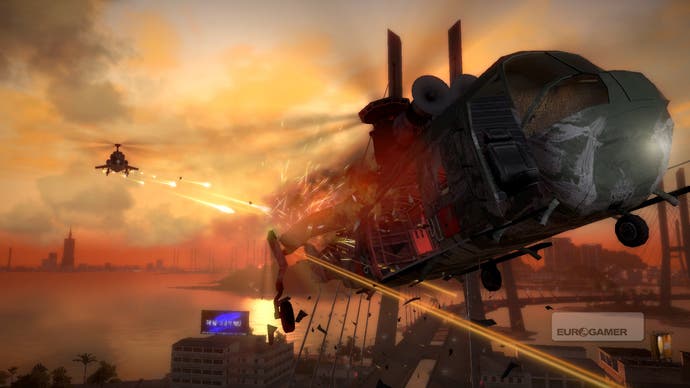
The unmistakable thwap of a chopper approaches. Rodriguez exhales long and leans his muscles with the easing of an analogue stick. He falls forward into the emptiness, swan diving into a base jump. 100 feet. 150 feet. 200 feet. An on-screen ticker charts his trajectory in rigid increments. 50 seconds later, Rodriguez pulls the ripcord and one of his limitless supply of parachutes snatches him out of the death fall. Rodriguez splashes into the islands shallows, windswept but otherwise without mark. Achievement unlocked.
Crackdown may have started the trend of rewarding players for leaping from a game's highest point, but never has the thrill been so keen as in Just Cause 2. In reaching Panau's summit, you must call upon your full range of abilities: hijacking or chartering a plane to climb the required distance before ejecting into the stratosphere and frantically firing your grappling hook in search of a latch point before you fall out of range. By the end of the exploit you will have enjoyed the game's two most enjoyable activities: admiring the picturesque island from afar, before plunging at breakneck speed through it. Achievement unlocked, indeed.
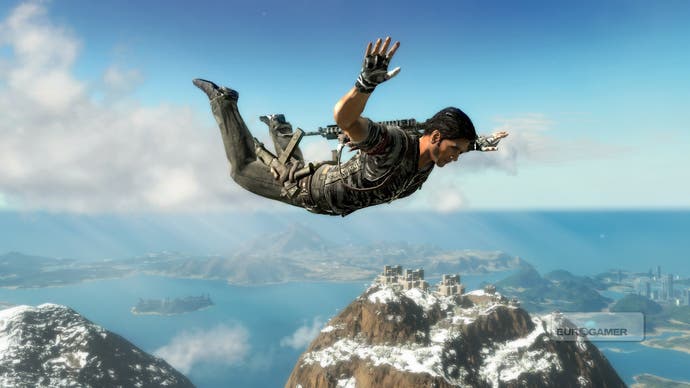
A critique of any open-world game has to be done in two halves. In the first, you examine the world itself and the tools you are given to interact with it. This is an assessment of the parameters for fun, feeling out the boundaries of potential play and the likelihood that wonderful, unique experiences will flourish for every player within that framework.
On this count, Just Cause 2 is without equal. The island itself is a lush, diverse playground consisting of every type of terrain and weather imaginable. It is beautiful, a picture-postcard amalgam of Pacific landscapes, every inch the dream holiday destination. Avalanche Studio's skill is not only in realising a coherent vision but also in maintaining its framerate and detail regardless of whether you're viewing the fronds of a palm from 2 feet away or the curve of the coast from a thousand.


